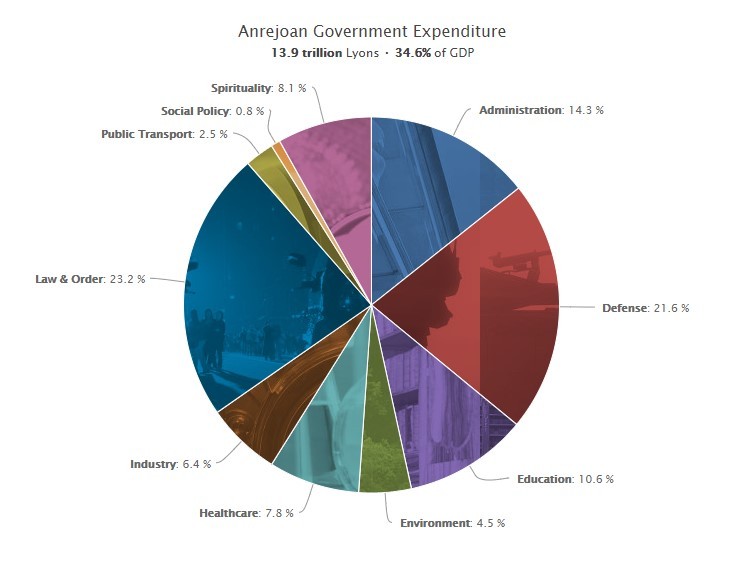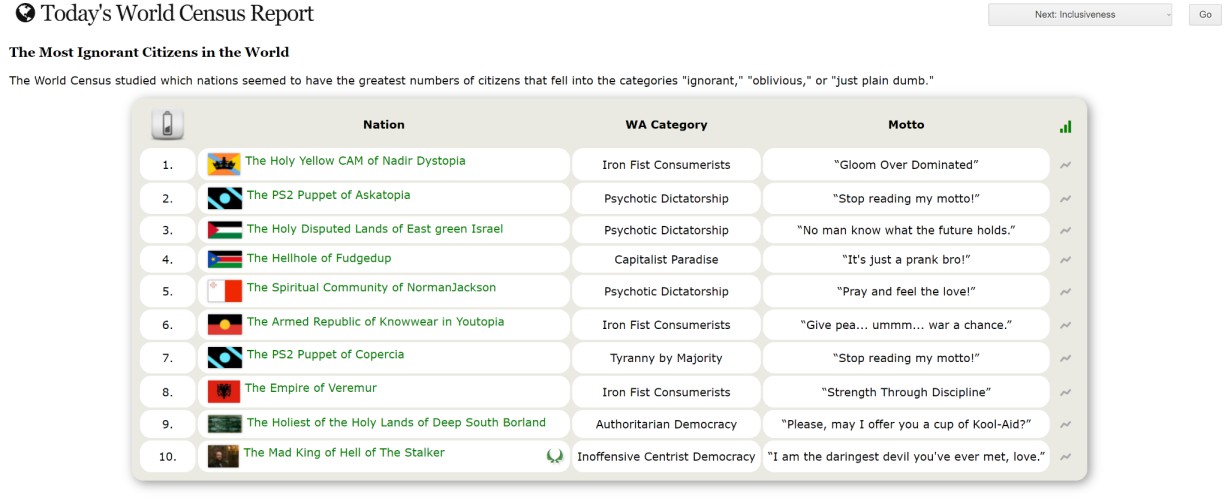NationStates is a unique browser simulator game, in which individuals create their own nations. What makes the game unique is the lack of a war aspect – whereas many other popular nation simulators, such as Politics and War, Cyber Nations, and others all have ways to declare war, NationStates does not.
Instead of fighting wars, players in NationStates work to build their nation how they prefer. Issues are periodically added to nations, and players must go through and respond. Depending upon their responses, their nation changes. For instance, one issue, called “Here Be Dragons,” deals with the population’s belief in dragons. Players can choose to add education funding to counteract silly beliefs, push religion so the populous knows better, fund science projects to create dragons, or support the notion that dragons exist. Plenty of other issues also exist, and the results of player choices not only affect more basic categories, such as population intelligence, the weather, industries, etc., but can also affect the major categories of civil rights, economy, and political freedom. In these basic categories, players can earn rankings, and if a nation is in the top 10% of a category (e.g. in the top 4% of authoritarian countries), then that will show up on their nation as a miniature achievement.

The game provides certain landmarks for nations, such as “Autocracy” for not having elections, “Pledge of Allegiance” for mandating the daily recitation of a pledge in schools, “Capital Punishment” for allowing the death penalty, and more. For those who love charts, the game provides charts about the leading causes of death, government expenditure, and the economy.
Players can join regions, which are mainly large communities for the players to hang out in. Regions can have their leaders chosen in one of two ways – if it was created with the Founder keeping Executive power, then the leader is the Founder until they appoints a new leader. If Executive power is not kept, however, then the leader becomes whichever nation gets the most endorsements. However, before talking about endorsements, the World Assembly must be addressed.
The World Assembly (WA) is modeled off of the United Nations. Nations can choose to join it, or not; to join means the player‘s nation has to follow all legislation passed by the WA, but the player then gains the ability to propose resolutions to be voted on by the WA. Additionally, only WA members can become leaders in non-Executive regions. This means that if a player wants a shot at leadership, they must be a member of the World Assembly. The road to taking over, however, is not simple.

Nations that are part of the World Assembly may endorse other nations in their region that are also part of the World Assembly. There are two “turns” in NationStates, one every twelve hours. After each turn, the nation that has the most endorsements in the region is made delegate, or leader. The Delegate of a region is able to appoint the other government positions, who can control embassies, telegrams, the appearance of the nation, polls, and even who is let into the region. Additionally, a Delegate can review proposed resolutions in the World Assembly, and promote or demote these proposals based on which ones the individual likes.
Delegates also wield major voting power in the World Assembly. For every endorsement a Delegate has, they gain one extra vote in the World Assembly. For some regions like Osiris, which has over 11,000 nations and is still only the fourth largest region, the elected delegate may wield thousands of votes.

Players who wish to win the delegation usually go about it in several ways; attempting to sway the public to gain as many endorsements as possible, utilizing secret backroom political deals, or organizing invasions. Invasions are not wars, no matter how similar they may sound. Instead, the following scenario occurs: say a certain Region X exists, and the current delegate (Nation X) has 20 endorsements. Three minutes before the turn change, thirty new nations (all members of the World Assembly) join Region X, and all endorse Nation Y. The current delegate, even if they were online, could not possibly remove enough nations to prevent Nation Y from winning the delegation, and so after a turn change, Nation Y becomes the delegate of Region X.
These invasions happen frequently, with varying levels of success. They are the only form of “warfare” in NationStates, however, and many regions have a military counterpart (a second region ruled by the first that acts as a mobile military body)
In summary, NationStates has many great aspects, from fun ways to rule your nation to political intrigue. Make your goal to have a booming arms industry, or a large black market in trout farming!
